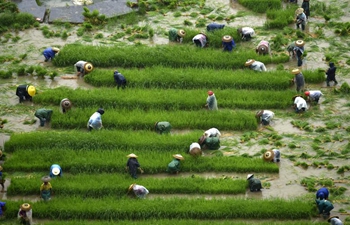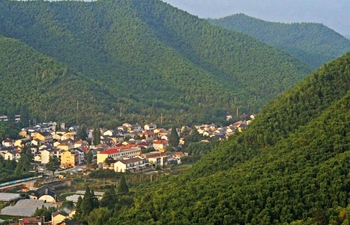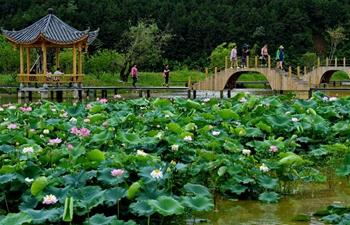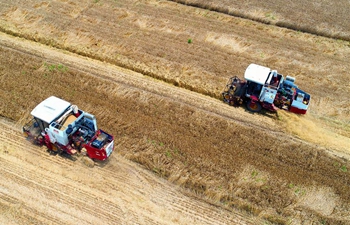YINCHUAN, June 5 (Xinhua) -- In first days of June, goji berries, also known as wolfberries, are already hanging in bright red bunches amid green leaves, nearly a month earlier than usual, in northwest China's Ningxia Hui Autonomous Region.
At a 200-hectare plantation in Hongsipu District of Wuzhong, 22-year-old Zhao Meihua is one of more than 100 people busy picking the berries. Under the burning sun, each of them wears a handkerchief to wipe away the sweat.
"Picking goji berries is not easy work. Besides the high temperature, we should also be careful as our arms and hands can get scratched by the thorns," she said.
Zhao has been picking gojis for 12 years, but still has many fresh scratches on her hands.
"I work 50 days during harvest season every year, earning up to 10,000 yuan (1,500 US dollars)," Zhao said."The harvest started
earlier this year, so we can work more days, pick more and earn more." Despite the hard labor, she said she enjoys the work.
Thanks to more days with high temperatures in April and the use of organic fertilizers, this year goji berries ripened about 20 days earlier than in the previous years, said Cao Youlong, from the national goji berry technology research center, adding advanced planting technology also contributed to the early harvest.
"Goji trees are harvested every 10 days during the season. It's good that we could have two more picking cycles this harvest, which means a 10-percent increase in production," he said.
"We have about 200 full-time workers in the plantation, but we still need another 600 to 700 people from nearby villages during this time of the year," said Hao Wanliang, owner of the plantation.
Hongsipu District is one of China's largest concentration areas for ecological immigrants -- more than 200,000 people have been relocated here from inhospitable environments in seven mountainous counties in southern Ningxia, and it is a main battlefield for poverty alleviation.
Before the immigration wave began in 1999, the district was largely covered by desert. Thanks to the unique soil and climatic conditions,
the goji berry industry has become a key for migrants to lift themselves out of poverty.
A new 287-hectare plantation was established this April, with Hao and two villagers as joint shareholders. Hao is in charge of planting techniques and marketing channels while the villagers provide labor and management.
"A large amount of land remained unused due to lack of water since people moved here in 2014," said Hai Chengjun from Hongchuan Village.
"The soil is rich in selenium, our goji berries, nurtured by organic fertilizers, are of higher quality and have a competitive edge in the market," said Li Maorong from Hongsipu Forestry Bureau.
There are now more than 3,733 hectares of goji berries in Hongsipu.
Sandstorms have also disappeared. Local residents enjoy the environmental and economic benefits.
"As goji berries grow in this land, so does our hope," Hai said.

















